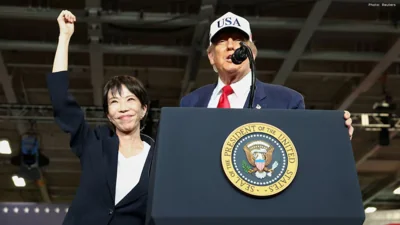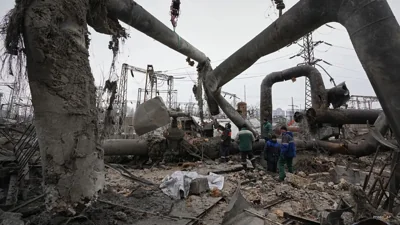
Post by : Monika
Photo:Reuters
Germany, the biggest economy in Europe, showed good news in May 2025. Its factories and industrial businesses made more products than they did in April. This rise in industrial output means the country’s industry might be getting stronger after some tough times.
What Is Industrial Output?
Industrial output is a way to measure how much factories and production plants produce in a given time. It includes many kinds of work, like:
Manufacturing: Making cars, machines, electronics, and many other products.
Mining: Extracting natural materials like coal, metals, and minerals.
Utilities: Producing electricity, water, and gas, which support many industries and homes.
When industrial output grows, it means factories are busy making goods. This usually helps the economy because it creates jobs and earns money for companies. But if output falls, it may mean fewer orders or problems in getting materials to make goods.
How Much Did Germany’s Output Increase?
In May 2025, Germany’s industrial output grew by 1.2% compared to April. While 1.2% may sound small, it is important in economic terms. This growth shows factories could produce more goods after facing difficulties earlier in the year. More products also usually mean more work for employees and more orders for companies.
Which Industries Did Well?
Several industries helped this growth, with the biggest contributions from:
Car Manufacturing: Germany is famous for its car brands like Volkswagen, BMW, and Mercedes-Benz. The car industry grew by nearly 5%, making more cars and parts in May. This was a major reason for the overall increase.
Energy Production: Factories that make electricity and gas increased their output by over 10%. This is very important because Germany has faced challenges with high energy costs in recent years.
Pharmaceuticals: The medicine and health product sector also grew by around 10%. Demand for health products remains strong, helping this industry.
Some other sectors, like electronics and chemicals, had mixed results. Some companies produced more, others stayed the same, and some made less.
Why Did Production Grow?
Several reasons helped Germany’s factories produce more in May:
More Demand: Both inside Germany and from other countries, more people and businesses wanted to buy German products. Exports, which are goods sent abroad, also increased.
Better Supply Chains: Earlier this year, many factories had trouble getting parts and materials because of delays and shortages worldwide. By May, these problems became less serious, allowing factories to work better.
Better Car Sales: After some ups and downs, the car market started to improve. More people and businesses began buying cars again, especially electric and hybrid cars, which are popular in Germany and Europe.
Government Support: The German government encouraged companies to invest in new technology and cleaner, greener ways to produce goods. This support helped some factories grow.
What Challenges Still Remain?
Even with this positive news, there are still some problems that Germany’s industry faces:
High Energy Costs: Electricity and gas prices remain high in Germany. This makes running factories expensive. If prices stay high or rise further, factories may slow down production.
Global Economic Problems: Many countries are facing slow growth or political tensions. This can reduce demand for German products, which might hurt factories.
Switch to Green Energy: Germany wants to use cleaner energy and better production methods to protect the environment. This change takes time and money. Some factories are still adjusting, which can slow down output.
Weather Issues: Dry weather caused low river water levels, making it harder to transport goods and use energy efficiently.
What Are Experts Saying?
Economic experts say the 1.2% rise in May is a hopeful sign but not a full recovery yet. It shows German factories can grow when conditions improve.
They expect the output to continue rising slowly if supply chains stay stable and demand remains good. Experts also say that industries need to keep investing in new technology and green production methods to stay competitive.
How Does This Affect People?
More industrial output can bring several good things for workers and families:
More Jobs: Factories that make more products usually need more workers. This can create more job chances.
Better Wages: When companies do well, they can pay workers better wages.
Economic Growth: A stronger industrial sector helps the whole economy grow, which benefits businesses and families.
But if energy prices rise too much or demand falls, factories might slow down again. This could mean fewer jobs or lower income.
Consumers may find more products like cars and machines available. However, prices for some goods might increase if companies face higher costs.
What Is Next for Germany’s Industry?
The coming months are important for Germany’s factories. If production keeps rising, it will help the country’s economy grow after a slow period.
The government and businesses will watch energy prices, global trade, and supply chains closely. They will also work to improve factory technology and support greener and more digital ways to make products.
Germany’s industrial output grew by 1.2% in May 2025.
Growth mainly came from car manufacturing, energy production, and pharmaceuticals.
Better demand and fewer supply problems helped factories produce more.
Challenges include high energy costs, global economic uncertainty, and the green energy transition.
Experts are hopeful but cautious about future growth.
More production could bring more jobs and help the economy grow.










Mattel Revives Masters of the Universe Action Figures Ahead of Film Launch
Mattel is reintroducing Masters of the Universe figures in line with its upcoming film, tapping into

China Executes 11 Members of Criminal Clan Linked to Myanmar Scam
China has executed 11 criminals associated with the Ming family, known for major scams and human tra

US Issues Alarm to Iran as Military Forces Deploy in Gulf Region
With a significant military presence in the Gulf, Trump urges Iran to negotiate a nuclear deal or fa

Copper Prices Reach Unprecedented Highs Amid Geopolitical Turmoil
Copper prices soar to all-time highs as geopolitical tensions and a weakening dollar boost investor

New Zealand Secures First Win Against India, Triumph by 50 Runs
New Zealand won the 4th T20I against India by 50 runs in Vizag. Despite Dube's impressive 65, India

BTS Tour Sparks Global Demand: Mexico Appeals for Additional Shows
BTS' comeback tour creates immense demand in Mexico, prompting President Sheinbaum to urge more conc